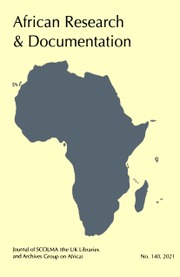No CrossRef data available.
Article contents
Eric M. Bonner, Africana bookseller
Published online by Cambridge University Press: 25 April 2022
Extract
Eric M. Borgzinner was born in London in 1903. His father, a German Jew, had emigrated to England as a young man. During the First World War the family changed its name to Bonner. Eric trained reluctantly for a career in banking. He served in the British Army during the Second World War ending his contribution, using his German language skills, in an Allied denazification project. Following the war he pursued his true passion, bookselling. He probably started as a “runner,” purchasing single items from one bookseller and making a few shillings or a pound by reselling it to a bookseller who specialized in the item.
Between 1949 and 1970 Bonner, an antiquarian bookseller, produced at least 39 catalogues, about two per year, almost all of which are in the British Library. He specialized in Africa, Australia, New Zealand, voyages, exploration, with some attention to the East and West Indies.
- Type
- Articles
- Information
- Copyright
- Copyright © International African Institute 1999
References
End notes
(1) Munger, Ned, Touched By Africa (Pasadena, California: Castle Press, 1983), 200Google Scholar, and see Modiano, Patrick, Out of the Dark, Stump, Jordan, trans. (Lincoln: University of Nebraska Press, 1998, first publ. 1996) 16, 31Google Scholar, for the story of a runner in Paris in the 1960s.
(2) Otto Haas at 49a, Belsize Park Gardens, and H. F. Ashbrook at 18c, Belsize Park, both specialized in music literature.
(3) Panofsky, Hans, “Acquisition of Library Materials from Africa,” Library Resources & Technical Services 7 (Winter 1963): 38, 40, 45Google Scholar.
(4) Various correspondence, January through October 1949, between James Packman and Leslie E. Bliss, Huntington Library.
(5) The term derives from Rostenberg, Leona and Stern, Madeleine B., Old Books, Rare Friends (New York: Doubleday, 1997), 4Google Scholar.
(6) Notes on Eric Bonner by C. C. Kohler, July 2, 1999.
(7) Bonner to Pollak, November 10, 1961, correspondence in the author's possession.
(8) Bonner gave a copy of the last title to the author in 1970.
(9) Bonner to Pollak, July 19, 1968.
(10) Taubert, Sigfried and Weidhaas, Peter, eds., The Book Trade of the World (Munich, New York, London, Paris. K. G. Saur, 1984) vol. IV, 285Google Scholar.
(11) The Book Collector, 9 (Autumn 1960) 269. It was reprinted again in 1993.
(12) Munger, Touched by Africa, 193-4.
(13) Book Collector, 8 (Spring 1969) 80. See also Rostenberg, Leona and Stern, Madeleine B., Bookman's Quintet (Newark, Delaware: Oak Knoll Books, 1980)Google Scholar.
(14) Hayman, Arne, Introduction to The Americana Reference Library of Robert G. Hayman (New Castle, Delaware: Oak Knoll Books, 1999), ivGoogle Scholar.
(15) Bonner to Pollak, June 4, 1968.
(16) Bonner to Irene Seligman, January 16, 1969.
(17) Bonner to Pollak, October 14,1971.
(18) Pollak, Oliver B. and Pollak, Karen, Theses and Dissertations on Southern Africa: An International Bibliography (Boston: G.K. Hall, 1976)Google Scholar, Rhodesia/Zhnbabwe: An International Bibliography (G.K. Hall, 1977)Google Scholar, and Rhodesia/Zimbabwe: World Bibliography Series (Oxford: Clio Press, 1979)Google Scholar.


